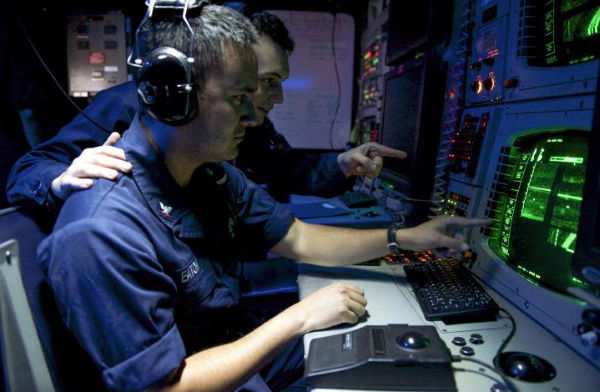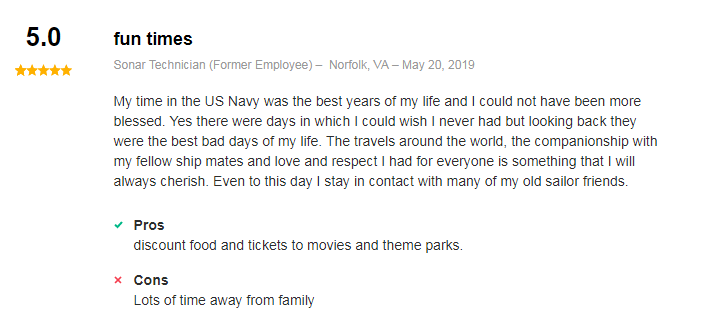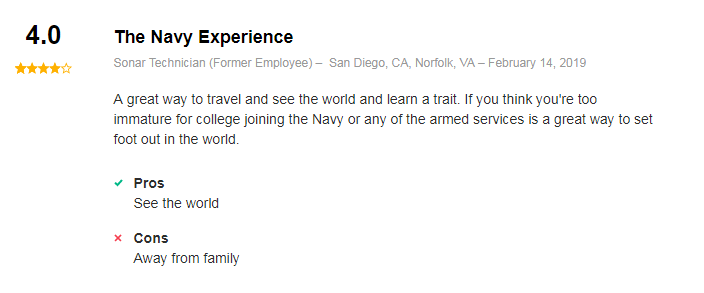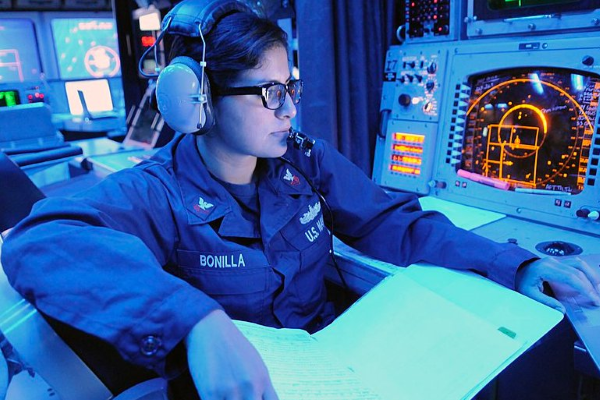Are you looking for a Navy shipboard position that is multifaceted in nature and also comes with a lot of responsibility?
Maybe you have a desire to work on one of the Navy’s more technologically advanced submarines.
Whatever your individual case may be, then entering into the Navy Sonar Technician career field may just be the right choice for you.
This has been a highly important and respected navy job since its inception in 1943.
The job name may have changed a few times over the years but the critical nature of this shipboard or submarine position has not.
Navy Sonar Technicians help with all different types of sonar related systems aboard frigates, cruisers, destroyers, and submarines.
It’s a great Navy job for those that know how to pay attention to detail and have a strong desire to sail all over the world.
Career Detail – Navy Air Traffic Controller: Career Details
Navy Sonar Technician Requirements and Qualifications
Here is what it takes to qualify to start training to become an enlisted US Navy Sonar Technician:
ASVAB Requirements
STG Rate (Surface Vessels)
- Minimum combined ASVAB Score of 223 on Arithmetic Reasoning, Math Knowledge, General Science, and Electronics Information
STS Rate (Submarines)
- Minimum combined ASVAB Score of 222 on General Science, Electronics Information, Arithmetic Reasoning, and Math Knowledge.
-OR-
- Minimum combined ASVAB Score of 222 on Arithmetic Reasoning, Verbal Expression, Mechanical Comprehension, and Math Knowledge
Additional Qualifications
- High School Diploma or GED
- Be between the ages of 17 and 34
- Be a United States Citizen
- Must be able to speak clearly
- Must have normal color vision
- Average or above-average hearing is an absolute must
- Must have good manual dexterity
- Successful completion of 8 weeks of Navy Basic Recruit Training held at Great Lakes Naval Training Center in North Chicago, Illinois
- Completion of a current Single Scope Background Investigation (SSBI) that will allow an enlisted person being to obtain a Secret or higher level security clearance
- Those enlisted as an ST that are going into Advanced Electronics Field Training will need to sign up for a 6-year enlistment
Additional requirements for Sonar Technician STS (submarine) position:
- 5-year active-duty commitment
- Pass submariner qualification tests
Training and Career Path to Become a Navy Sonar Technician

Here are the types of technical training that Navy Sonar Technicians have to go through.
Navy Technical Training Information
STG Rate (Surface Vessels)
- Basic Electronics School: Great Lakes Naval Training Center – North Chicago, Illinois
6-weeks in duration
This is the standard navy electronics foundation course
- Class “A” School: Naval Training Center San Diego – San Diego, California
10-weeks in duration
This course will not only expand upon what the recruit learned in basic electronics school but also go into detail about how to operate and maintain sonar systems, electronic systems, data collection equipment, and underwater surveillance equipment.
STS Rate (Submarine)
- Basic Enlisted Submarine School: Naval Submarine Base New London – Groton, CT
9 weeks in duration
The course introduces the new Navy recruit to basic submarine systems and what it’s like to be a member of ‘The Silent Service’.
- Class “A” Technical School: Naval Submarine Base New London – Groton, CT
37 weeks in Duration
Teaches the aspiring submariner basic electricity, electronics, and computer technical knowledge and skills.
It also teaches STS technicians’ underwater surveillance techniques and how to collect scientific data.
Related Article – Navy Boatswain’s Mate (BM): Career Details
On the Job Training
Once Class “A” Technical School is completed, the new Navy ST recruit will then begin intensive on the job training on the specific workings of the type of Navy vessel they will be assigned too.
How Much Are US Navy Sonar Technicians Paid?
Navy pay, like all branches of the military, is based on rank and time in service.
Most new US Navy Sonar Technicians will start out at the pay grade of Seaman Recruit (E-1).
In cases where a recruit has special job-related knowledge or training, they may start out as a Seaman Apprentice (E-2) or Seaman (E-3).
Here is the current paytable for Navy enlisted personnel:
Miscellaneous Pay, Allowances, and Incentives
Other forms of pay, benefits, and incentives that Navy Sonar Technicians can get are:
- Housing allowance (BAH)
- Subsistence allowance (Food – BAS)
- Temporary duty pay
- Hazardous duty pay
- Sea duty pay (Separation pay)
- Submarine pay (STS only)
- 100% paid healthcare
- Tuition reimbursement
What’s Life Like as a Navy Sonar Technician?
Whether you do this job on or under the water it is a highly technical position that requires attention to detail and teamwork to perform it successfully.
The equipment is sophisticated but the most important aspect of this job will be your eyes and ears.
It will help keep your entire ship or submarine crew out of harm’s way and you will also be an integral part of your vessels offensive wartime capabilities.
Here are some of the duties that Navy Sonar Technicians are expected to perform:
- Aid in safe navigation for ships and submarines
- Aid in search and rescue operations
- Follow attack protocols when asked to do so
- Jam enemy sonar
- Maintain, repair, calibrate, and make adjustments on all assigned electronic systems, data collection equipment, and underwater surveillance equipment
- Perform maintenance on assigned underwater surveillance equipment, scientific data collection systems, and combat control systems
- Be able to operate all of the assigned underwater surveillance and scientific data collection equipment
- Conduct routine and random tests on the underwater surveillance and scientific data gathering equipment they are responsible for
- Operate and maintain ship or submarine sonar-based combat control systems
- Be proficient at using a variety of hand tools and portable power tools.
- Perform additional duties as assigned aboard a submarine (STS only)
Navy Sonar Technicians can reasonably expect to spend over 60% of their time aboard a ship or submarine.
That does not bode well for those who are married and raising children.
Those stationed together on ships and especially submarines generally form tight bonds that often turn into lifelong friendships.
Here is a video that talks more about what Navy Sonar Technicians do:
Job Reviews
Here is what two former Navy enlisted members who were Sonar Technicians had to say about their job experiences on the website Indeed.com:


US Navy Sonar Technician Civilian Career Opportunities
Although you may not get to pick and choose your location, there are surprisingly many jobs that are available in the civilian world for former Navy Sonar Technicians.
Most of them pay well above average salaries too.
Some of these jobs are military associated and others are not.
Related Article – Navy Logistics Specialist (LS): Career Details
Unrelated sonar technician jobs include such things as ocean floor mapping and water salvage operations.
Here is a random list of companies that are known to employ Ex-Navy Sonar Technicians:
- General Dynamics Information Technology – Pensacola, FL
- Amee Bay, LLC – San Diego, CA
- AECOM – Norfolk, VA
- Great Lakes Water Authority – Detroit, MI
- BAE Systems – Keyport, WA
- Global Diving & Salvage, Inc. – San Ramon, CA
- Oceaneering International – Charleston, SC
References:
- 5 Worst Jobs in the Air Force - June 20, 2024
- 4 Steps For Visiting An Air Force Recruiter Near You - June 19, 2024
- Air Force Safety Specialist (1S0X1) - June 19, 2024
General FAQ
How much does a Navy sonar technician make?
Navy Sonar Technicians are paid according to rank and time in service. A new sailor with less than two years in service can expect a monthly base pay of $1,700, before submarine pay, allowances or other incentives.
Do I need a security clearance to become a Navy Sonar Technician?
To become a Sonar Technician in the Navy, you’ll need to pass a Single Scope Background Investigation and obtain a Secret level security clearance.
How long is STS A School?
The length of A School training to become a Navy Sonar Technician depends on whether your specialty is in surface vessels or submarines. For surface (STG), it’s 16 weeks. For submarines, A School is 46 weeks.
How do I become a sonar technician?
To qualify as a Navy Sonar Technician you’ll need a combined ASVAB score of 222/223 in Arithmetic, Math, General Science, and Electronics. You’ll need normal color vision and excellent hearing, and must enlist for a minimum of six years.
What does a submarine sonar technician do?
Submarine Sonar Technicians operate submarine sonar equipment and other oceanographic equipment to aid in navigation, assist in search and rescue missions, jam enemy sonar, and provide underwater surveillance.

